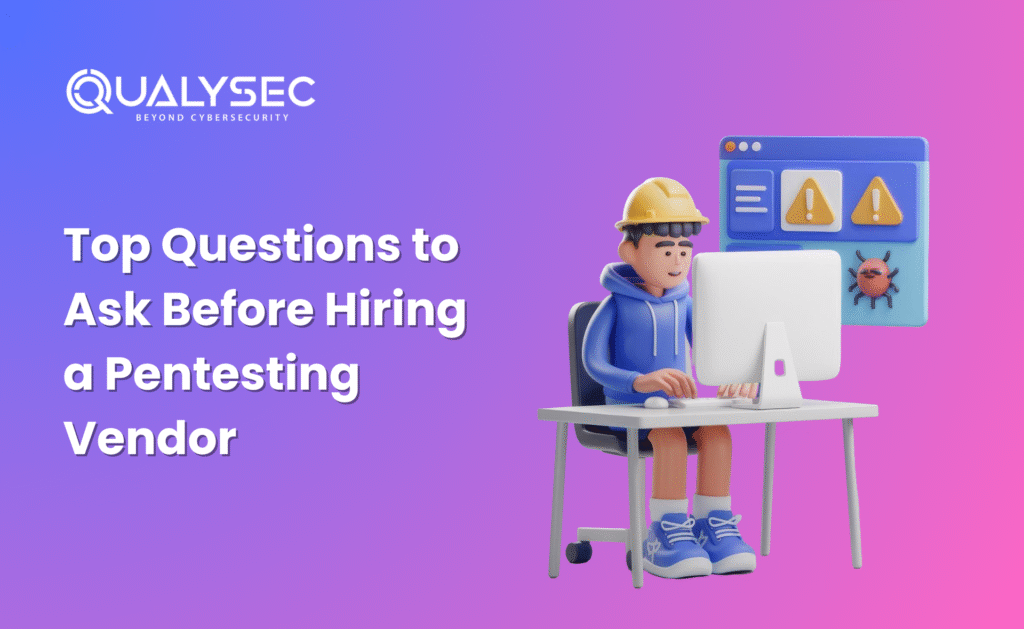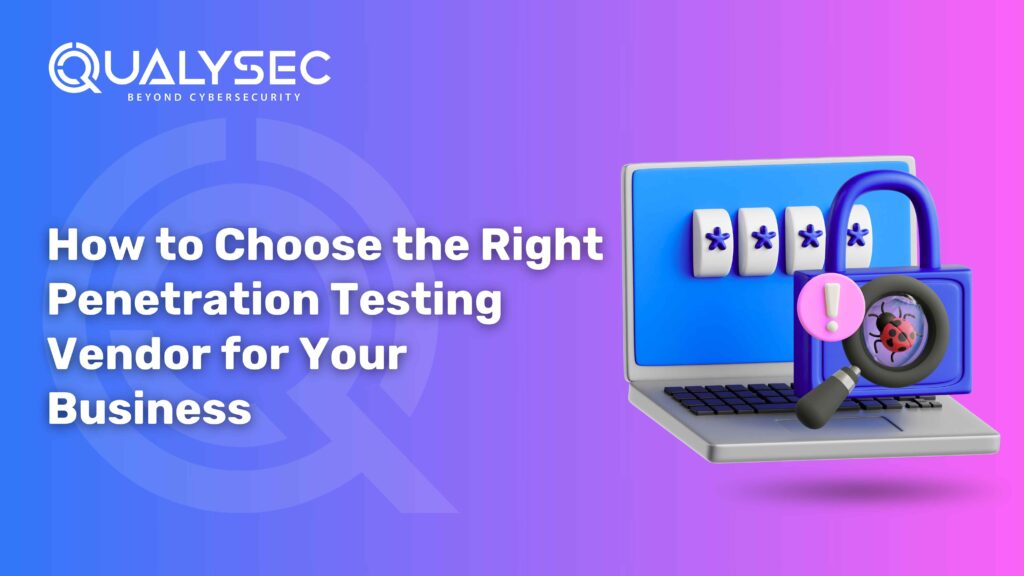Top Questions to Ask Before Hiring a Pentesting Vendor
As our world becomes more connected and digital, cyber threats are evolving just as fast, if not faster. Organizations, irrespective of their size or sector, remain perpetually vulnerable to data breaches, system intrusions, and ransomware attacks. This has prompted penetration testing (pentesting) to become a necessary part of a strong cybersecurity plan. A skilled pentesting vendor can spot and fix security weaknesses long before attackers get a chance to exploit them. But here’s the catch – the effectiveness of the test depends entirely on who’s doing it. Choosing the right vendor isn’t just a technical decision; it can be the difference between staying secure and facing a costly breach. This blog provides you with the best questions to ask before hiring a pentesting vendor. We will also highlight Qualysec, a well-known brand in the cybersecurity industry, as the best Process-Based Penetration Testing Company. So, you will have an idea of what an efficient and professional vendor is like. Latest Penetration Testing Report Download 1. What Experience and Expertise Do You Bring to the Table? Before hiring a pentesting vendor, it’s imperative to analyze their technical depth and experience. Security is not universal. A pentesting vendor skilled in testing fintech apps may lack similar know-how when dealing with healthcare systems. Ask: How long have you been doing pentests? Do you possess experience in our sector or dealing with comparable apps? Can you provide success stories or case studies? Pro tip: Hire vendors such as Qualysec, who have domain-specific knowledge and experience working with multiple platforms, industries, and technologies. Their technical infrastructure and compliance expertise guarantee more detailed and actionable testing. 2. Are You Following Hybrid or Process-Based Penetration Testing? The approach counts. Most vendors are still using outdated or too traditional testing models. You require a vendor that takes a hybrid methodology – integrating automated tools and manual testing methods under a formal process. But there are vendors like QualySec that follow a unique, self-created methodology, known as process-based penetration testing. We have created different processes for different technologies, which we keep updating with time. We have a data-driven methodology, which involves deep scanning against all the vulnerabilities listed in our database. Apart from processes, we also check for weak points in the application, network, or device of clients through both manual testing and automated testing using the most reliable tools. This way, our team leaves zero scope of leaving any loophole left behind. 3. What Types of Penetration Testing Services Do You Offer? Not еvеry pеntеsting sеrvicе is thе samе. Somе providеrs dеlivеr pеntеsting as only specialization among a widе rangе of sеrvicеs, which can еnsurе focus and еxpеrtisе. Idеally, sеlеct a providеr spеcializing еntirеly in pеnеtration tеsting and vulnеrability assеssmеnt. Thеir nichе focus guarantееs thеy’rе always ahead of thе latеst attack vеctors, еxploits, and dеfеnsеs. Qualysec, for instance, provides specialized penetration testing services on: Web applications Mobile apps APIs Cloud infrastructure Network layers This specialized emphasis results in more thorough and productive evaluations. 4. What Testing Methodologies Do You Follow? High-end vendors do not depend on one methodology. Rather, they merge several industry standards to provide multi-layered and comprehensive penetration testing. Inquire if the vendor adheres to standards such as: OWASP Top 10 SANS 25 OSSTMM (Open Source Security Testing Methodology Manual) PTES (Penetration Testing Execution Standard) A combination of methodologies helps vulnerabilities get found from various ways and nothing is left behind. Qualysec is unique by utilizing a blend of OWASP, SANS, OSSTMM, and PTES for complete-spectrum security coverage. 5. How Is Scope Defined, and What Are the Rules of Engagement? Setting the scope and determining the rules of engagement is an essential step before testing. The vendor should consult with you intensively to set: Testing limits Assets to be tested Type of testing (black box, grey box, white box) Timetables Communication protocols Daily reporting, straightforward expectations, and risk management practices must be included in the engagement. Qualysec maintains an open and cooperative onboarding process, establishing scope, objectives, and communications before any test is started. 6. Can You Provide a Sample Report? A pentest is only as good as report. Your report is your roadmap for remediation of vulnerabilities, so it must be: Comprehensive and detailed Readable for technical and non-technical stakeholders Actionable A good report will have: Vulnerability name Description and effect Severity rating Steps to replicate Screenshots Remediation recommendations CWE and OWASP mapping References Qualysec’s reports are in-depth, visually marked up, and compliance-ready so that development teams can jump straight into remediation. 7. Is Multiple Retesting Included After Fixes Are Applied? Fixing vulnerabilities is one step – you must retest to ensure patches are effective and didn’t introduce new problems. You can request the vendor: How many retests are included? Is there a time limit to complete retests? What happens if new issues are encountered during retesting? Providers such as Qualysec provide several and even unlimited retest options, based on the plan. The Enterprise and Business plans provide retest over a longer period, giving peace of mind when teams roll out fixes. 8. Who Conducts the Testing – In-House Experts or Outsourced Teams? Outsourcing risks compromising quality and confidentiality. You prefer a vendor that employs in-house security experts who are trained, screened, and regularly updated on current threats and methods. Ask: Do you еmploy in-housе еxpеrts or third-party contractors? Arе your tеstеrs cеrtifiеd (е.g, OSCP, CEH, CISSP)? What is thе avеragе еxpеriеncе lеvеl of your tеsting tеam? Qualysеc conducts all tеsting in-housе, with a staff of cеrtifiеd еthical hackеrs who havе еxtеnsivе domain knowlеdgе and еxpеriеncе working in sеvеral industriеs. 9. What Tools and Techniques Do You Use? The top vendors implement manual testing skills with automated tools. Automated tools alone cannot detect everything, particularly business logic defects or multi-step attacks. Seek vendors who use a mix of commercial and open-source tools like: Burp Suite Pro Netsparker SQLMap Metasploit Nessus Nmap Nuclei Kali Linux toolsets Qualysec chooses tools by asset, functionality, and technology stack, with detailed analysis in each test. 10. How Transparent






